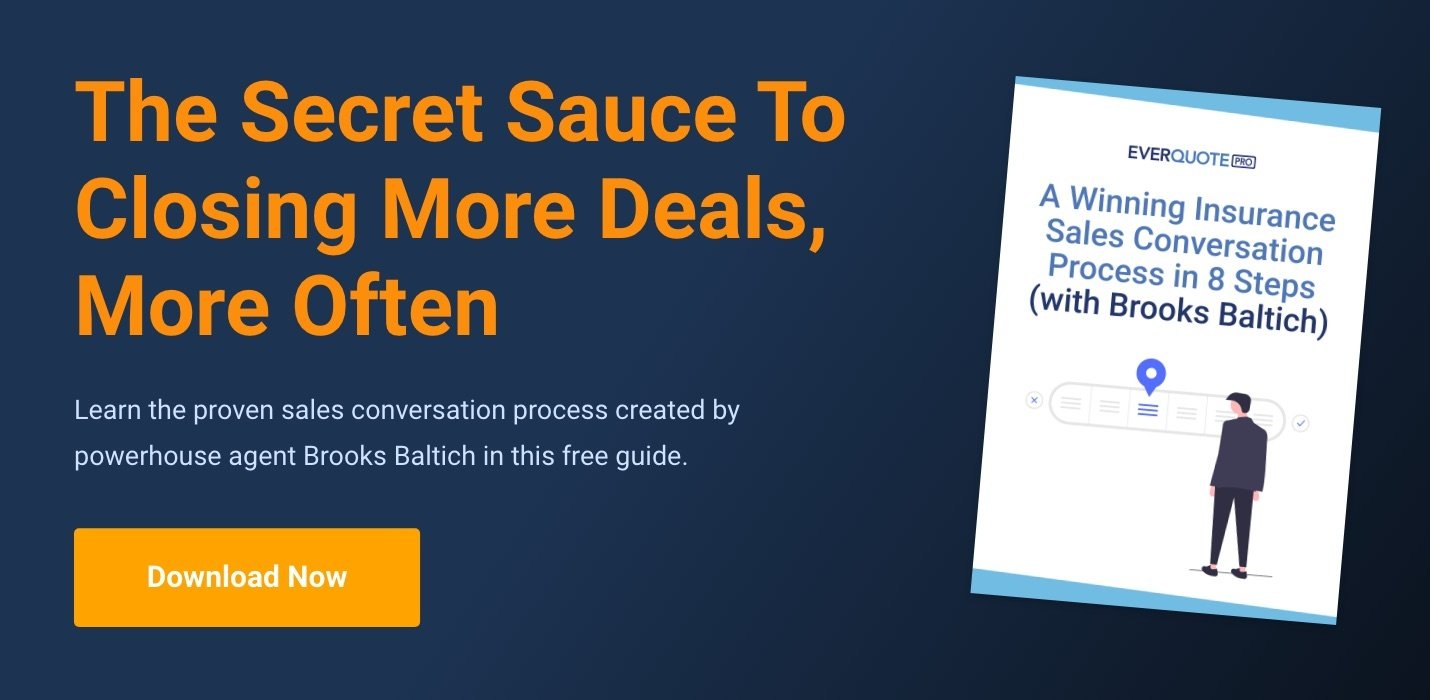- Home»
- EverQuote Pro Blog»
- Insurance Producers & Agents: Doing These 9 Things Will Tank Your Sales Goals
Insurance Producers & Agents: Doing These 9 Things Will Tank Your Sales Goals

The hype around goal setting is nothing new—just do a quick search for the term “goal setting” and you’ll get about 958,000,000 results in half a second. And for insurance agents specifically, you’d be hard-pressed to not find an article touting the importance of setting goals as a key aspect for success. That’s because, as cliche as it may seem, the agents who succeed in our industry tend to be the ones who set goals to help them rise to the top.
But this article is not your average “here’s how to set goals” article.
Instead, I think we need to talk about what not to do when setting goals as an insurance agent. (Tweet this!) In this article, I’m going to touch on nine things you should not do when setting your insurance producer sales goals, and why you should avoid doing these things.
Sales Goals For Insurance Agents: What To Avoid
1. Don’t set vague goals.
OK, this is the obvious one but I have to state it, because the baseline for the rest of this article is that you are actually interested in setting goals that are SMART. In order to be successful, you must set growth goals. Decide now that (when you’re done reading this article of course) you’re going to take what you’ve learned and establish some goals for your agency using the tips offered here. While you may find some success without explicit goals, it won’t measure up to what you could achieve had you set real, tangible goals, established a process to achieve them, and worked consistently in that direction.
Don’t miss out on binding another policy. See what your processes are lacking and take action: Download 10 Things Every Agent Should Be Doing (But That Most Aren’t).
2. Don’t set your goals before understanding your data & metrics.
I strongly advise against setting goals blindly. Pulling them from the sky without any context, like “I want to grow my book by five times,” is not necessarily realistic or attainable—you may not have the foundation in place to achieve them. What is realistic and attainable for your agency? Once you know, you can adjust that pie-in-the-sky goal to something you’ll actually be able to accomplish.
Too many agents are unsure where their money and time are being spent; without this knowledge, it’s difficult to try to identify realistic goals—you need a benchmark to help you know where you are and where you want to go. (Check out 3 Most Important KPIs For Insurance Companies In Growth Mode to learn more about KPIs or “key performance indicators.”)
While the individual metrics you should be paying attention to may vary by your agency’s unique situation, here are a few important KPIs you should know for your agency:
- How many calls it takes to close a policy
- Call response rate
- Email open rate
- Cost per acquisition
- Cost per policy
Typically, cost per acquisition is the most important metric to identify, as it is your “bottom dollar” – how much are you spending to acquire each new client? Cost per policy is similar: Finding out how much time and money it takes you to close that individual as a customer can help you become more efficient in your process and identify ways to do it more cost-effectively (and put more money into your pocket).
For district managers setting insurance producer sales goals, pay attention to the following things:
- How much your books of business have grown overall over time. At EverQuote, we’ve seen many agents who achieve impressive growth in their book (by 3–5X) during the first year, but then only see a small fraction of that growth the following year. Understanding these (in)consistencies in the growth of your books of business can shed light on high performers as well as agents who may be slipping when it comes to process and performance. When you have metrics to prove out what you’re thinking, you can address any performance issues with producers directly with evidence and help your agents get back on track.
- Who your most successful agents are and what they’re doing. By identifying your strongest performers you can implement their processes and best practices with the rest of your team, giving everyone a much better chance to excel.
After personally working directly with hundreds of agents, I can confidently say that, in my experience, failure to understand your own metrics and data ultimately hinders your growth.
3. Don’t underestimate the power of consistently working on your goals.
It’s the tortoise vs. the hare parable—while small bursts of energy may put you ahead in the short term, consistent work over the long haul is what really leads to winning. Once you’ve established sales goals based on your actual metrics, you need to break those goals down into small bites you can work toward on a daily, weekly, monthly, and quarterly basis.
Daily goals are small things you can integrate into your 8 A.M.-5 P.M. work schedule every day. For example, a daily goal might be “Put three new meetings on the schedule with net new people.” This isn’t a terribly challenging goal, but it does require some work—that makes it a good daily goal.
From here, you may establish a weekly goal to set six net new meetings. Doing this every week, consistently, over the course of a year will build into something big.
4. Don’t rely exclusively on referrals to meet your sales goals.
One of the biggest challenges I hear from all types of insurance agents (scratch agents, agents who have been in business for a couple years, and even agents five to ten years into their careers) is that they are relying heavily on their network for referrals to drive business with no other sources.
While you absolutely should utilize your network of friends and family to its full referral potential, it can’t be the only way you drive business. Once that well runs dry, it’s gone! Instead, agents should diversify and work on both capitalizing on referrals as well as injecting new life into their pipelines by putting themselves in front of leads from external sources outside their immediate network.
| At EverQuote, we offer insurance leads for auto, home, and life in all 50 states and do not require any contractual obligations to access them. You can customize leads based on your preferred geographic area, and return any leads with incorrect information. Because we don’t resell leads at a future date, unlike some lead vendors, our agents can work their leads without having to worry about new competition from the same source. You can learn more about what sets EverQuote leads apart here. |
5. Don’t just have a copycat mentality.
Some agents do only what works for other agents in their quest to grow their books of business. And while you shouldn’t reinvent the wheel for things that do work, you need to develop your own process for your agency goals. People have different strengths, different weaknesses, and sell to different types of leads in different markets—one size does not fit all. When you try to force someone else’s sales processes wholesale, you lose what makes you unique as an agent.
Instead of being a copycat, take a little bit from each successful insurance agent you want to emulate and implement what works. You obviously don’t want to replicate everything they do, but you can and should recognize—and replicate—the parts that are successful and fit within your processes and specific context.
6. Don’t focus solely on close rates.
If you’re looking only at your close rate, you can miss the other things in your sales process that helped you achieve it. For example, it wasn’t just that your close rate was ten percent; you had to spend $5,000 with a team of ten producers contacting a thousand leads to generate that ten percent. That example of a ten percent close rate differs greatly from an agent closing ten percent off of twenty referrals. Rates change, scales of economy differ, carriers fall off, companies issue new policies, etc.—if you have blinders on and focus just on close rates, it’s easy to forget how you got to that place, and you may end up ignoring parts of your sales process that could benefit from adjusted sales goals.
7. Don’t ignore your low-middle-high goals.
Along with consistency, make sure you’re aware of the different levels of the goals you’re working towards. Here are some important questions to consider to help you identify these goals:
- What can I do today to change and become more efficient? This is a low-end goal.
- What’s a gap that I can’t change overnight, but is possible for me to attack this week or month? This is a mid-level goal.
- How can I grow my territory, write in multiple states, etc.? This is a high-level goal, and relates to more macro ambitions. These goals require many actionable steps that may take months, if not years, of work to achieve.
8. Don’t forget your resources—they can help you reach your goals.
You don’t have to figure out everything on your own—we live in an age where a wealth of knowledge is literally at our fingertips. You can also attend conferences, find thought-leaders you admire and listen to and read about what they do, and connect with insurance agents who have done the job successfully for years. Get face-to-face time with these people, and ask them to mentor you. Build in a budget for yourself and your team to help you develop your own personal goals as well as insurance producer sales goals.
You can also use free resources (like the EverQuote blog and our whitepapers and guides) to help you learn industry best practices and tips from successful agents.
9. Don’t focus only on the insurance world.
I want all agents who are setting sales goals to understand that sales knowledge is vast and not confined to just the insurance industry. Look at sales strategies and tips in other industries, too; these tips almost always translate to our industry, and they can help you understand different ways to approach your process and spark ideas about things you can adjust.
Be open to change and set your sales goals accordingly.
My final tip: Don’t get lost in your own ego and your own process when setting sales goals. Be open to looking at new ways of doing things and suggestions from others—trying something new may help you reach the goals you set.
Unlock predictable growth with EverQuote.
Our representatives are standing by to help you succeed.
Call 844-707-8800
Weekdays, 9AM-5PM (ET)
Call 844-707-8800
Weekdays, 9AM-5PM (ET)
Accelerate your growth.
Complete the form below or just call 844-707-8800 to learn how we can help you achieve your goals.
By clicking "Get Started", I consent by electronic signature to being contacted by EverQuote, including by automatic telephone dialing and/or an artificial or prerecorded voice (including SMS and MMS - charges may apply), regarding EverQuote for Agents, even if my phone number is listed on a Do Not Call Registry. I also understand that my agreement to be contacted is not a condition of purchasing any goods or services, and that I may call (844) 707-8800 to speak with someone about EverQuote for Agents.
By clicking "Get Started", I affirm that I have read and agree to this website’s Privacy Policy and Terms of Use, including the arbitration provision and the E-SIGN Consent.
* Mandatory fields
 Product Overview
Product Overview Blog
Blog FAQs
FAQs Webinars
Webinars eBooks & Resources
eBooks & Resources